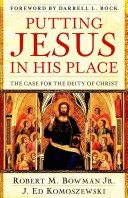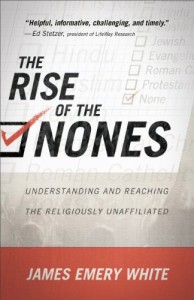Don Closson explains the five lines of evidence that Jesus is God from the book Putting Jesus in His Place.
Jesus Shares the Honor Given to God
 Defending the deity of Christ can be a source of anxiety for some believers. Perhaps it is because our defense often consists only of a couple of proof texts which are quickly challenged by Jehovah’s Witnesses and others. Even worse, some Christians themselves are troubled by passages that seem to teach that Jesus is something less than God, that He is inferior to the Father in some significant way. They are fine with Jesus being the suffering servant, the Messiah who died for our sins, but less sure of His role in creation or as a member of the triune everlasting “I Am” of the Old Testament.
Defending the deity of Christ can be a source of anxiety for some believers. Perhaps it is because our defense often consists only of a couple of proof texts which are quickly challenged by Jehovah’s Witnesses and others. Even worse, some Christians themselves are troubled by passages that seem to teach that Jesus is something less than God, that He is inferior to the Father in some significant way. They are fine with Jesus being the suffering servant, the Messiah who died for our sins, but less sure of His role in creation or as a member of the triune everlasting “I Am” of the Old Testament.
 A recent book by Robert Bowman and Ed Komoszewski titled Putting Jesus in His Place is a great confidence builder for those wrestling with this key doctrine. The book offers five lines of evidence with deep roots in the biblical material. The book is organized around the acronym H.A.N.D.S. It argues that the New Testament teaches that Jesus deserves the honors only due to God, He shares the attributes that only God possesses, He is given names that can only be given to God, He performs deeds that only God can perform, and finally, He possesses a seat on the throne of God.
A recent book by Robert Bowman and Ed Komoszewski titled Putting Jesus in His Place is a great confidence builder for those wrestling with this key doctrine. The book offers five lines of evidence with deep roots in the biblical material. The book is organized around the acronym H.A.N.D.S. It argues that the New Testament teaches that Jesus deserves the honors only due to God, He shares the attributes that only God possesses, He is given names that can only be given to God, He performs deeds that only God can perform, and finally, He possesses a seat on the throne of God.
Let’s look at the first line of evidence for the deity of Christ, that Jesus deserves the honor that should only be given to God. To honor someone is to acknowledge “their place in the scheme of things—to speak about them and to behave toward them in a manner appropriate to their status and position.”{1} As creator of the universe God deserves the highest level of honor and glory, since nothing can claim a higher degree of status or position. As a result, the Old Testament teaches that only God deserves the honor and glory that is part of human worship and He will not share this honor with anything else. In Isaiah 42 God declares that “I am the LORD; that is my name! I will not give my glory to another or my praise to idols” (Isaiah 42:8).
So how does Jesus fit into this picture? In John 5 Jesus declares that the Father has entrusted judgment to the Son so that “all may honor the Son just as they honor the Father.” He adds that “He who does not honor the Son does not honor the Father” (John 5:22, 23). Referring to his pre-existence with the Father before creation, Jesus says, “And now, Father, glorify me in your presence with the glory I had with you before the world began” (John 17:5). In these passages, Jesus is claiming the right to receive the same honor and glory due to the Father; in effect, He is claiming to be God in the same way that the Father is God.
Jesus Shares the Attributes of God
If Jesus is honored in the New Testament in a manner reserved only for God, it follows that one who is given the honor and glory reserved for God is also worthy of worship. So it’s not surprising that the book of Hebrews tells us that Jesus is to be worshipped by the angels or that in Matthew’s Gospel the apostles worshipped him when he came to them walking on water (Hebrews 1:6; Matthew 14:33). Perhaps the most stirring image of Jesus being worshipped is in Revelation where every creature in heaven and on earth sing praises to the Father and to the Lamb, giving them both honor and glory and reporting that the four living creatures and the elders fell down and worshipped Him (Revelation 5:13-14).
The New Testament also teaches that Jesus shares divine attributes that only God possesses. When this claim is made, Muslims, Jehovah’s Witnesses and others protest by pointing out that Jesus exhibited the very human attributes of hunger, fatigue, and pain. This valid observation does not conflict with the traditional Christian teaching that Jesus possessed two essential natures—one divine and one human. There is no reason to assume that one set of attributes cancels out the other. It should be added that although Jesus shares a divine nature with the Father, He does not share the same properties within the Godhead or trinity. The Father sent Jesus into the world; Jesus died on the cross and assumed the role of our permanent high priest.
Jesus clearly states in John 14 that to see him is to see the Father; both are equally God (John 14:10). In Colossians, Paul goes to great lengths to argue that all of God’s divine attributes are present in Christ. He writes that Jesus is “the image of the invisible God” and that “. . .God was pleased to have all his fullness dwell in him (Colossians 1:15, 19). He summarizes the same idea by adding that “in Christ all the fullness of the Deity lives in bodily form” (Colossians 2:9). The writer of Hebrews concurs in the opening paragraph of that book, saying that “the Son is the radiance of God’s glory and the exact representation of his being” (Hebrews 1:3).
Jesus shares the Father’s attribute of pre-existing the created universe and His own physical incarnation. John’s Gospel tells us that Jesus was with the Father in the beginning when the universe was created, and Paul adds that Jesus is before all things (John 1:1-3; Colossians 1:16-18). In other words, Jesus has always existed and is unchanging. He has been given all authority on heaven and earth (Matt. 28:18). He deserves the honor, praise, glory, and worship of all creation.
Jesus Shares the Names Given to God
Those who question the deity of Christ complain that the New Testament just doesn’t teach it, that it doesn’t come right out and say that Jesus is God. Is this really the case?
The New Testament uses two key words for God: theos, the general Greek word for deity, and kurios, usually translated as “lord.” Theos is the word most often used to designate God the Father and is also used a number of times in direct reference to Jesus, especially in the Gospel of John. John begins his book with the familiar proclamation that Jesus, the Word, was with God (theos) in the beginning, and that the Word (Jesus) was God (theos). Later in the chapter, John adds that “No one has ever seen God, but God (theos) the One and Only, who at the Father’s side, has made him known” (John 1:18). Jesus, the Word, is described by John as being with God in verse one, and at the Father’s side in verse eighteen, and in both cases is given the title theos or God.
The Gospel John also contains the confession by Thomas that Jesus is his Lord (kurios), and God (theos). John makes sure that we understand that Thomas was talking about Jesus by writing “Thomas said to Him,” that is, to Jesus, “’My Lord and my God.’”
Paul uses theos in reference to Jesus a number of times. In Romans 9:5 he describes Jesus as “Christ, who is God (theos) over all.” And in Titus he writes that we are waiting for our “blessed hope—the glorious appearing of our great God (theos) and Savior, Jesus Christ (2:13).” Peter portrays himself as a servant of Christ who is writing to those through whom “the righteousness of our God (theos) and Savior Jesus Christ have received a faith as precious as ours (2 Peter1:1).”
All four gospels begin with John the Baptist’s ministry of “preparing the way of the Lord” as fulfillment of Isaiah’s prophecy in Isaiah 40:3. The prophet wrote, “In the desert prepare the way for the LORD; make straight in the wilderness a highway for our God.” The Hebrew word translated LORD in this verse is the unspoken special word for God used by the Jews consisting of four consonants called the tetragrammaton. The New Testament Gospels are applying the word Lord to Jesus in the same way that the Old Testament referred to Yahweh as LORD.
Jesus Does the Deeds that Only God Can Do
It was universally recognized by the Jews of Jesus’ day that “God created the heavens and the earth (Genesis 1:1; cf. Isaiah 37:16).” So it might be surprising to some that the New Testament also gives Jesus credit for creation. Paul teaches in Colossians that Jesus created “all things.” To make sure that no one misunderstands his point, he adds that “all things” includes “things in heaven and on earth, visible and invisible, whether thrones or powers or rulers or authorities; all things were created by him and for him. He is before all things, and in him all things hold together” (Colossians 1:16-17). Paul wanted to be clear: Jesus is the creator God of the universe.
While Jesus’ role in creation is enough to establish his divine nature, He also exhibited supernatural divine power during His ministry on earth. Unlike the Old Testament prophets and New Testament apostles, Jesus did not have to petition a higher power to heal or cast out demons. He had inherent divine power to accomplish his will. Other than giving thanks, Jesus did not pray before performing miracles. In fact, the apostles reported that some demons obeyed them only when they invoked Jesus’ name. There were a number of occasions when Jesus realized that power had gone out from Him even without His intention to heal (Luke 6:19; Mark 5:30; Luke 8:46).
Jesus not only healed and cast out demons, but also had direct power over nature. When the disciples were frightened on a boat, He “rebuked the winds and the waves, and it was completely calm” (Matthew 8:26). When thousands were following him without food, He fed them miraculously (Matthew 14:20-21).
The New Testament teaching that salvation is possible through Jesus Christ alone would also have serious implications for Jewish readers. The Old Testament teaches that God is the only source of salvation. For instance, Psalm 62 teaches that “My soul finds rest in God alone; my salvation comes from Him. He alone is my rock and my salvation.” How then does one explain the numerous references claiming Jesus to be the source of salvation? Matthew points out that Mary will call her son Jesus because he will save his people from their sins (Matthew 1:21). Jesus declares of himself that “God did not send his Son into the world to condemn the world, but to save the world through Him (Jn. 3:17).” There are also instances where Jesus directly forgives the sins of individuals, thus attracting hostile attention from the Jews (Luke 7:47-49; Mark 2:5-7).
The Psalmist writes that it is the Lord God “who will redeem Israel from all its iniquities” and that “Salvation belongs to the Lord.” John summarizes nicely when he writes, “Salvation belongs to our God who is seated on the throne, and to the Lamb!”
Jesus Has a Seat on God’s Throne
Our last line of argument for the deity of Jesus Christ refers to his claim to have a place on the very throne of God. From this throne, Jesus rules over creation and will judge all of humanity. He literally possesses all authority to rule.
Jesus made this claim clear during His questioning by the high priest Caiaphas the night of his capture. Caiaphas asked him, “Are you the Christ, the Son of the Blessed One?” (Mark 14:61) If Jesus wasn’t God, this would have been a great opportunity for Him to clear up any misconceptions. But instead of denying His divinity, Jesus says “I am,” admitting to being God’s unique Son, and goes on to say, “you will see the Son of Man sitting at the right hand of the Mighty One and coming on the clouds of heaven” (Mark 14:62). The high priest’s response was dramatic; he tore his clothes and declared that those present had heard blasphemy from the lips of Jesus. They understood that Jesus was making a direct claim to being God, for only God could sit on the throne of the mighty one.
In His response to the high priest, Jesus draws from a number of Old Testament passages. The book of Daniel describes this “Son of Man” as having an everlasting dominion that will never be destroyed (Daniel 7:13-14). The passage adds that the Son of Man has been given authority to rule over all people and nations, and that men of every language will worship him. He is also described as coming with the clouds of heaven, imagery that is used a number of times in the Old Testament to indicate divine presence. Exodus describes a pillar of cloud that designated God’s proximity to the Jews, while the book of Psalms and the prophet Isaiah both picture God riding on clouds in the heavens (Psalm 104:3; Isaiah 19:1). The point here is that Jesus is connecting Himself to this “Son of Man” who will sit at the right hand of the Father, have everlasting dominion and authority, and will be worshipped by all men. This kind of language can only be used to describe God.
The New Testament makes it clear that there is nothing not under the authority and power of Jesus. John writes that the Father put all things under His power (John 13:3). Paul adds that the Father seated Jesus at His right hand in the heavenly realms, far above all rule and authority and power and dominion and above every name that is named (Ephesians 1:20-21). Jesus sits on the judgment seat, He sent the Holy Spirit, He forgives sinners, and is our perfect eternal high priest (2 Corinthians 5:10; Acts 2:33; 7:59-60; Hebrews 7-10).
The New Testament provides multiple lines of evidence to make the case that Jesus is God. The only question remaining is whether or not we will worship him as a full member of the triune Godhead, the only eternal, self-existing, creator God of the universe.
Note
1. Robert M. Bowman and J. Ed Komoszewski, Putting Jesus In His Place (Grand Rapids: Kregel, 2007), 31.
© 2010 Probe Ministries
 During an eclipse, the heavens declare the glory of God by allowing us to see things about the sun we wouldn’t be able to observe any other way, beautiful and gloriously resplendent. Just before totality we can see “Baily’s Beads.” Only seen during an eclipse, bright “beads” appear at the edge of the moon where the sun is shining through lunar valleys, a feature of the moon’s rugged landscape. This is followed by the “diamond ring” effect, where the brightness of the sun radiates as a thin band around the circumference of the moon, and the last moments of the sun’s visibility explode like a diamond made of pure light. After the minutes of totality, the diamond ring effect appears again on the opposite side of the moon as the first rays of the sun flare brilliantly. These sky-jewelry phenomena are so outside of mankind’s control that witnessing them stirs our spirits (even on YouTube!) with the truth of Romans 1:20—”God’s invisible qualities—his eternal power and divine nature—have been clearly seen, being understood from what has been made, so that people are without excuse.”
During an eclipse, the heavens declare the glory of God by allowing us to see things about the sun we wouldn’t be able to observe any other way, beautiful and gloriously resplendent. Just before totality we can see “Baily’s Beads.” Only seen during an eclipse, bright “beads” appear at the edge of the moon where the sun is shining through lunar valleys, a feature of the moon’s rugged landscape. This is followed by the “diamond ring” effect, where the brightness of the sun radiates as a thin band around the circumference of the moon, and the last moments of the sun’s visibility explode like a diamond made of pure light. After the minutes of totality, the diamond ring effect appears again on the opposite side of the moon as the first rays of the sun flare brilliantly. These sky-jewelry phenomena are so outside of mankind’s control that witnessing them stirs our spirits (even on YouTube!) with the truth of Romans 1:20—”God’s invisible qualities—his eternal power and divine nature—have been clearly seen, being understood from what has been made, so that people are without excuse.” A total solar eclipse offers so much more, though, than Baily’s Beads and the Diamond Ring. At the moment of totality, the pinkish arc of the sun’s chromosphere (the part of the sun’s atmosphere just above the surface) suddenly “turns on” as if an unseen hand flips a switch. I knew God is very fond of pink because of how He paints glorious sunrises and sunsets in Earth’s skies, but those fortunate enough to see a total eclipse can see how He radiates pinkness from the sun itself! The heavens declare the glory of God!
A total solar eclipse offers so much more, though, than Baily’s Beads and the Diamond Ring. At the moment of totality, the pinkish arc of the sun’s chromosphere (the part of the sun’s atmosphere just above the surface) suddenly “turns on” as if an unseen hand flips a switch. I knew God is very fond of pink because of how He paints glorious sunrises and sunsets in Earth’s skies, but those fortunate enough to see a total eclipse can see how He radiates pinkness from the sun itself! The heavens declare the glory of God! For the few minutes of totality, the naked eye can see the sun’s lovely corona (Latin for crown) streaming out from the sun. We can’t see the corona except during an eclipse because looking straight at the sun for even a few seconds causes eye damage, and because the sun’s ball of fire overwhelms the (visually) fragile corona. This is another way that an eclipse allows us to see how the heavens declare the glory of God.
For the few minutes of totality, the naked eye can see the sun’s lovely corona (Latin for crown) streaming out from the sun. We can’t see the corona except during an eclipse because looking straight at the sun for even a few seconds causes eye damage, and because the sun’s ball of fire overwhelms the (visually) fragile corona. This is another way that an eclipse allows us to see how the heavens declare the glory of God.
 What made the Romans such a formidable force? Discipline and adaptability. Being able to march long distances and maneuver across a variety of terrain. Timing and distance determine the victor of any confrontation. To do this, they needed shoes that were durable and able to grip the ground firmly.
What made the Romans such a formidable force? Discipline and adaptability. Being able to march long distances and maneuver across a variety of terrain. Timing and distance determine the victor of any confrontation. To do this, they needed shoes that were durable and able to grip the ground firmly. We are also told to take up the Shield of Faith (Ephesians 6:16) to extinguish the flaming arrows of the evil one. The favored shield in the time Ephesians was written was the Roman scutum, a large shield that protected most of the soldier’s body, enabling the Romans to protect both themselves and each other in tight formations without sacrificing their defense when fighting in looser formations. Most deaths in ancient battles occurred after, during, and after a rout. Therefore projectiles were used to disrupt and to instill fear before the two sides met in melee. Standing firm against hails of projectiles was key to surviving the battle.
We are also told to take up the Shield of Faith (Ephesians 6:16) to extinguish the flaming arrows of the evil one. The favored shield in the time Ephesians was written was the Roman scutum, a large shield that protected most of the soldier’s body, enabling the Romans to protect both themselves and each other in tight formations without sacrificing their defense when fighting in looser formations. Most deaths in ancient battles occurred after, during, and after a rout. Therefore projectiles were used to disrupt and to instill fear before the two sides met in melee. Standing firm against hails of projectiles was key to surviving the battle. Finally, Ephesians 6:17 refers to the Sword of the Spirit, or the word of God. In conjunction with the scutum was the gladius, a short sword primarily used for thrusting and short cuts. It was the legionary’s primary weapon. After throwing their pila (specialized javelins) to disrupt the enemy formation, the Romans drew their swords and closed the distance to engage in hand-to-hand fighting. Their armor and discipline enabled them to weather the brutal melee far better than their opponents. Ideally, this caused the enemy to rout.
Finally, Ephesians 6:17 refers to the Sword of the Spirit, or the word of God. In conjunction with the scutum was the gladius, a short sword primarily used for thrusting and short cuts. It was the legionary’s primary weapon. After throwing their pila (specialized javelins) to disrupt the enemy formation, the Romans drew their swords and closed the distance to engage in hand-to-hand fighting. Their armor and discipline enabled them to weather the brutal melee far better than their opponents. Ideally, this caused the enemy to rout.

 It is always important for us to get out of debt. I have written another booklet on the subject of debt. If you are in debt or want to learn more about government debt and personal debt, I encourage you to obtain that booklet. Email me your name and address at
It is always important for us to get out of debt. I have written another booklet on the subject of debt. If you are in debt or want to learn more about government debt and personal debt, I encourage you to obtain that booklet. Email me your name and address at